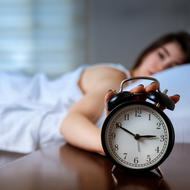Take the Quiz: How are you sleeping?
Posted by Cheryl Cryer on Jul 26th 2023
Sleep is a fundamental aspect of human well-being, vital for overall health and functioning. It is during sleep that our bodies undergo crucial processes: promoting physical and mental restoration, memory consolidation, and immune system regulation. Unfortunately, in today's fast-paced world, sleep often takes a backseat to busy schedules leading to a rise in sleep-related problems.
According to the Centers for Disease Control and Prevention (CDC), approximately one in three adults in the US do not get enough sleep. Sleep deficiency has been linked to an increased risk of developing mental health disorders, including anxiety and depression. In a study published in the Journal of Clinical Sleep Medicine, individuals with insomnia were found to be ten times more likely to have clinical depression and seventeen times more likely to have clinical anxiety than those without insomnia.
Lack of adequate sleep significantly impairs cognitive function, memory retention, and decision-making abilities. In a report by the RAND Corporation, it was estimated that the US loses around $411 billion annually due to reduced productivity caused by sleep deprivation.
Prolonged sleep deprivation is also associated with an increased risk of developing chronic health conditions such as obesity, type 2 diabetes, cardiovascular diseases, and even certain types of cancers.
It is evident that nurturing healthy sleep habits is a vital aspect of self-care and promoting overall wellness.
Integrating herbal remedies, including cannabinoids like CBD, THC and other medicinal plants, can be an effective, natural approach to improve sleep quality and address sleep-related issues. By understanding the significance of sleep and adopting a holistic approach to rest, individuals can unlock the potential for enhanced physical, emotional, and mental well-being.
Take the Quiz
Take the quiz to help you evaluate your sleep quality. Keep track of your answers, and remember, this quiz is not a substitute for professional medical advice. Let's get started!
1. How would you rate the quality of your sleep?
a) Excellent
b) Good
c) Fair
d) Poor
2. How long does it usually take you to fall asleep?
a) Less than 15 minutes
b) 15-30 minutes
c) 30 minutes to 1 hour
d) More than 1 hour
3. How often do you wake up during the night?
a) Rarely or never
b) Occasionally (1-2 times)
c) Frequently (3-4 times)
d) Very frequently (more than 4 times)
4. How refreshed do you feel upon waking up in the morning?
a) Fully refreshed and energized
b) Moderately refreshed
c) Slightly refreshed
d) Not refreshed at all
5. Do you experience any of the following sleep disturbances? (Select all that apply)
a) Insomnia (difficulty falling asleep or staying asleep)
b) Sleep apnea (breathing pauses during sleep)
c) Restless legs syndrome (uncomfortable sensations in the legs)
d) Night sweats or hot flashes
e) None of the above
6. How often do you feel sleepy or fatigued during the day?
a) Rarely or never
b) Occasionally (1-2 times a week)
c) Frequently (3-4 times a week)
d) Very frequently (almost every day)
7. Do you consume caffeine, nicotine, or alcohol close to bedtime?
a) None of the above
b) Occasionally
c) Frequently
d) Regularly
8. How would you describe your stress levels?
a) Very low
b) Low to moderate
c) Moderate to high
d) Very high
9. How would you rate your overall mood and emotional well-being?
a) Excellent
b) Good
c) Fair
d) Poor
10. How physically active are you during the day?
a) Very active (regular exercise)
b) Moderately active (light exercise or physical activity)
c) Sedentary (limited physical activity)
d) Inactive
11. How would you describe your sleeping environment?
a) Quiet, comfortable, and conducive to sleep
b) Occasionally noisy or slightly uncomfortable
c) Often noisy or uncomfortable
d) Very noisy or uncomfortable
Let's calculate your score and take a look at for some recommendations.
Mostly A's: Your sleep quality seems excellent. No specific herbal remedy is recommended. However, you can explore relaxation techniques or sleep hygiene practices to enhance your already healthy sleep routine.
Mostly B's: Your sleep quality is good, but there is room for improvement. Consider trying herbal blends such as a calming tea with CBD hemp flower, chamomile and lavender. Additionally, focus on maintaining a consistent sleep schedule and optimizing your sleep environment. Product suggestion: Love Spell Herbal Tea
Mostly C's: Your sleep quality is fair, and you may benefit from herbal remedies such as passionflower, lemon balm, or a combination of CBD and other cannabinoids. It would also be helpful to practice stress management techniques, improve sleep hygiene, and consider making adjustments to your sleep environment. Product suggestion: MycoBotanicals Stress Decompress Capsules and 1000mg Full Spectrum CBD Oil Drops
Mostly D's: Your sleep quality is poor, and it is recommended to consult a natural wellness practitioner or other healthcare professional. Along with professional guidance, you may consider trying herbal remedies like ashwagandha or CBD combined with THC to help improve your sleep. It's crucial to address any underlying medical conditions or sleep disorders that may be contributing to your poor sleep quality. Product suggestion: Stress Support CBD Tea or 25MG CBD +5MG THC Nighttime Gummies
Final Thoughts
Remember, it's important to consult with a healthcare professional or a qualified herbalist before starting any herbal remedies, including those containing CBD or other cannabinoids like THC.
They can provide personalized advice and help address any specific concerns you may have. Additionally, implementing good sleep hygiene practices, maintaining a consistent sleep schedule, and creating a relaxing sleep environment can also contribute to better sleep.
Best of luck in improving your sleep quality!

